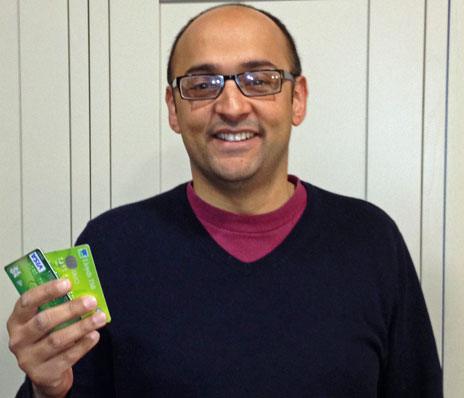A lost bag - returned by the open web
- Published
- comments

Ramzan Karmali with his returned credit cards
It's become a commonplace event - someone loses something valuable on public transport and then uses the power of social media's network effect to get it back.
But what is interesting about the case of Ramzan Karmali and his missing wallet is that, to put it politely, his network is minuscule.
Ramzan is a BBC business producer, a cheerful former City trader who sits opposite me in Broadcasting House. On Thursday evening however he wasn't so cheerful when he got off the suburban train home to find he'd left a bag containing his wallet behind.
Now Ramzan isn't the most prolific user of social networks - on Twitter he has just 160 followers - but he thought it was worth trying to send out an alert. So he tweeted this:

Now of course it was extremely unlikely that any of his followers would have been on that train - but he followed up with this:

And a number of his friends (not me, I'm ashamed to confess) took the hint and retweeted his appeal. So that quickly multiplied the audience for his tweet to several thousand people.
Late that night, Ramzan got a message from someone with the Twitter handle @flipchartqueen. This was Sheila Thorne, who had been sitting opposite him on the train. She'd spotted the lost bag, taken it home and called the police.
Then, after several hours of hearing nothing back, she googled Ramzan, whose name was on the credit cards in his wallet.
The following day, they met in Central London, Sheila handed over the bag, and Ramzan presented her with a box of chocolates.
"Five years ago this would never have happened," he says. "A combination of honesty and technology got my bag back."
Now, despite the many learned treatises written on the network effect, it remains unpredictable - what decides whether a joke goes viral, or an appeal for help remains unheard? In this case, it appears to have been a combination of Google and Twitter that combined to bring Ramzan's plea to exactly the right audience.
But there is another person my colleague needs to thank for making the spread of vital information work so smoothly.
Twenty years ago today the nuclear research centre CERN put out a press release announcing that it was making freely available something called the World Wide Web, "a global computer networked information system".
Its creator, Tim Berners-Lee, was determined that the web should be an open system, not a series of walled gardens controlled by governments or corporations.
And, while we can argue over just how open the web remains, if Ramzan's tweet had been locked inside something like the Compuserve network of the 1980s rather than out on the web, then Sheila might never have seen it.